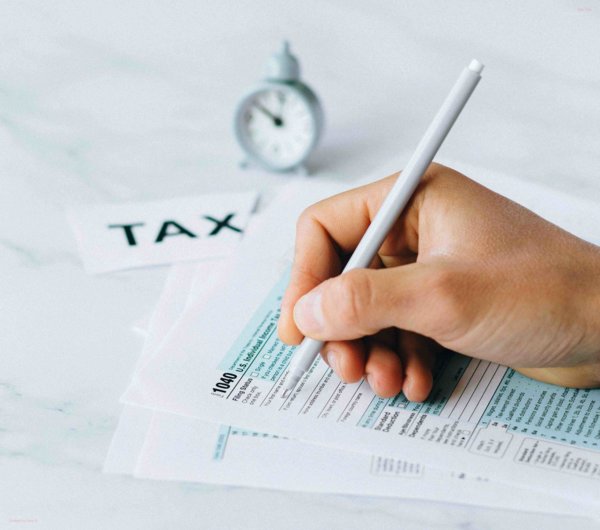Minor And Income Taxes: Do They Need To File?
Does a minor have to file taxes? The simple answer is yes. Once you start making money and it gets to a certain threshold, you start paying taxes, regardless of your age.
This applies even if you earn from YouTube or work an after-school job.
If you make some good money, you have to report it to the IRS.
This brings a string of questions to mind. When should your child file? Who files the tax return? What is the threshold? In this article, we’ll answer your questions and shed light on the many technicalities of minor taxes.

Photo by Thomas Park on Unsplash
Why Do Minors File Taxes?
The government implemented the "minor tax" in 1986 to close a loophole. Before then, many parents transferred their assets to their children’s name, even though these assets produced income. This meant that the income from those assets would be taxed at the child's tax rate, saving the family money.
To prevent this, the government taxes a child's unearned income above a certain threshold at the parent's marginal tax rate.
Does a Minor Need to File Taxes?
Two major things determine a minor’s tax obligations:
Dependency Status: Claiming your child as a dependent on your tax return depends on some factors. This may include their age, income, and marital status. Generally, you can claim a child as a dependent if they:
are under 19
are under 24 and a full-time student, and financially supported by you
are permanently disabled
do not file a joint return (if married)
have lived with you for half the year in the U.S.
have a social security number (SSN)
Income: This includes the total amount of money a child earns throughout the year. Once the amount hits certain thresholds, the child needs to file taxes. However, this is also dependent on the type of income.
What Are the Different Types of Income?
The following are the different categories of income:
Earned Income
This is the money you get paid for your work. It includes:
Wages and salaries from a regular job
Tips
Commissions
Any taxable portion of a scholarship (money received for educational purposes that must be reported on a tax return)
Unearned Income
This is money you receive without actively working for it. It includes:
Interest earned on savings accounts
Dividends from stocks or mutual funds
Capital gain distributions from investment accounts
Rental income
Gross Income
This income is the total amount of earned and unearned income before any deductions or taxes.
So, When Does a Minor Have to File Taxes?
This depends on whether the minor is a dependent or independent one.
Dependent Minor
Being a dependent does not exclude your child from filing an income tax return. A dependent child needs to file if they fulfill certain requirements. This includes the following:
If your child’s unearned income is above $1,300 (for tax year 2024), they need to file a tax return.
If your child’s earned income exceeds the standard tax deduction for the tax year, they must file - for example, $14,600 for tax year 2024.
Your child needs to file a tax return if they made $400 or higher in tips or self-employment income.
You need to add both earned and unearned income to know if the total reaches the IRS threshold.
Independent Minor
If you can’t claim your child as a dependent on your return, the requirements are usually the same as those of adults. They have to file a return if the gross income exceeds the threshold set by the IRS for that year.
Also read: What Happens If You Don’t File Taxes?
Do Minors Have To Pay Taxes If They Earn Less Than The Standard Deduction?

Photo by Nataliya Vaitkevich on Pexels
Your child’s income may not reach the threshold that requires filing. However, there are still several good reasons to file a tax return, and they include:
Get a tax refund: If your child’s employer withheld taxes from their earning, you can file a return to get that money back.
Qualifying for credit: Your child may qualify for the Earned Income Credit (EITC), a tax credit for low- and moderate-income workers. This credit can reduce their tax liability or even result in a refund. They may also qualify for others, like additional child tax credit, health coverage tax credit, or first-time home buyer credit.
Start a paper trail: Filing taxes early helps your child learn about tax issues and build good habits for the future. It also creates a record that can be useful for things like applying for financial aid in college.
What Tax Forms Do Children Use to File Tax Returns?
The tax forms your child uses to file their tax returns depend on two things. This may include your child’s category of income and how you want to report it.
If it’s earned income, you’ll use Form 1040 to file it like everybody else.
If it’s only unearned income, you can use Form 8615 to determine the tax they need to report on. Then, they can attach it to their regular tax return Form 1040.
Parents can include their dependent child's unearned income on their tax return using Form 8814. This is possible if they fulfill certain requirements. For example, if a child only has an unearned income of less than $11,000. And they're under 19 (or a full-time student under 24) at the end of the year.
Final Thoughts
To reiterate, the simple answer to “Does a minor have to file taxes?” is yes. But in many cases, it will depend on your income and dependency status. While it might not be an exciting responsibility, filing taxes is important. It is a crucial step toward financial independence for young earners. However, tax laws can be complex. It's always best to consult a tax professional if unsure about anything. You may also use IRS-approved tax preparation software.
Also read: How Do Tax Returns Work
 Our customer support is available 24/7:
Our customer support is available 24/7:

